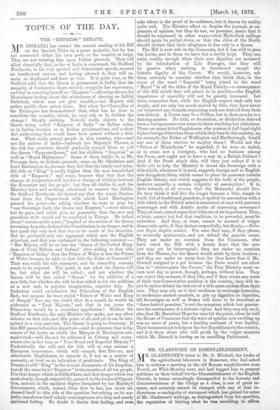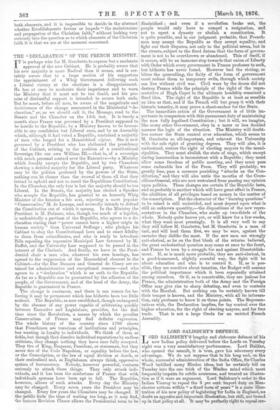MR. GLADSTONE ON DLSESTABLISHMENT M R. GLADSTONE'S letter to Mr. G.
Mitchell, the leader of the agricultural labourers in Somerset, who had asked him to address a meeting in the old Roman amphitheatre near Yeovil, on Whit-Monday next, and had begged him to present petitions on their behalf for the Disestablishment of the English Church, in terms exceedingly disrespectful to the honesty and disinterestedness of the Clergy as a class, is one of great in- terest, and certainly cannot be charged with any of that in- directness or ambiguity of statement which has gained for some of Mr. Gladstone's writings, as distinguished from his speeches, the reputation of hinting what he was unwilling to affirm and steering a middle course between any two intel- ligible political alternatives.- It would be impossible to write a franker letter than Mr. Gladstone's, and for the most part we should say that even as re- gards the political principles on which he appears to base his approval or disapproval of an Established Church, the letter is as sound as it is frank. Not that the letter is, even in outline a summary of these principles. There are considerations to which Mr. Gladstone does not allude at all, which seem to us of very great moment in relation to the policy of an Establish- ment, and there are some to which he does allude, the value of which appears to depend on the special application they might receive in particular cases. Still, considering the necessary terseness of the communication' and the class of politicians for whose benefit it was intended, we think it would have been difficult for Mr. Gladstone to give the agricultural labourers of Somersetshire a weightier lesson in the political considerations by which the equity and wisdom of State Establishments of Churches should be tested, than he has given • in his letter to Mr. Mitchell.
It is now, we suppose assumed on all hands that, at all events in a land of popular institutions and of many Churches and many creeds, a national Establishment of religion can only be justified on grounds of policy, and not on grounds of abstract moral obligation. We are aware that the favourite argument against it is derived from considerations of abstract justice, but we do not think that any wise advocate of such Establishments ever thinks of basing his case on assumptions of that kind. Clearly, where Establishments can be success- fully maintained, the case for them must proceed on the same lines on which it would be attempted to justify national libraries, or reformatories, or middle-class schools, or any other institutions to which certain sections of the community might object, as unfair burdens on their means and un- profitable for themselves ; and not on the high a priori line of absolute national duty and obligation. This much being assumed, the next question is as to the class of con- siderations on which the policy or impolicy of a national establishment of religion will chiefly turn. The corre- spondence between Mr. G. Mitchell and Mr. Gladstone indi- cates three such leading considerations,—the consideration of • • the acceptability of the Established Church to the majority of the nation, including their wish to retain it as Established; secondly, the favourable or unfavourable effect of the Estab- lishment on the effective maintenance and propagation of the Christian faith ; and lastly, the tendency of its influence for good or ill on the characters of the clergy and the laity who belong to it. On the first head, Mr. Gladstone in- timates his belief that the English Established Church repre- sents the religion of a considerable majority of the people, though he does not think the same can be said of the Scotch Established Church. On the second head, he expresses no very decided opinion, but says pretty plainly that he is at least not convinced that the existence of an Establishment is unfavourable to "the maintenance and propagation of the Christian faith." And on the third head, he indicates strong dissent from the opinion of his correspondent that the Estab- lishment has so demoralised the clergy as to make them eminently unfit for their office as the pastors and religious advisers of the people. For our own parts, it would be on the third head that we should feel most doubt of the benefi- cial effect of an Establishment. Not in the least that we are disposed to agree with Mr. G. Mitchell, that any appreciable number of the clergy in any part of the country,—and the context rather implies that he refers to a number so large as to give character to the class,—are "tyrants of the worst class, cruel, hypocritical, selfish, and empty-headed." This is doubtless the judgment of a fierce politician, whose own strong political bias has a great deal to do with the moral judgments which he forms. But we are disposed to think that one of the chief subtractions from the otherwise good effect of an Establishment is the ten- dency it has to identify the political bias of the clergy with the bias of the landowners, and to place it in antagonism with the political bias of the masses of the people; and quite apart from the question which of these two leanings is the wiser, it can hardly be doubted that the clergy lose religious power with the people by the mere fact of their wide political alienation from them. It cannot be denied for a moment that the Wesleyans, whose theological creed is identical with the creed of the Church, have gained enormous religious in- fluence over the people by the mere fact of their greater political sympathy with them, though, no doubt, they have lost a good deal of breadth an moderation of spirit by the operation of the same causes which have tended to bring them into political sympathy with the people. Still there can be no question but that the great want of sym- pathy between the clergy and the agricultural labourers, for example, on questions of wages and the other matters in agitation between them and their employers, has vastly diminished the religious influence of the Church over the Labourers. And on this ground, therefore, we should be disposed to agree much less with Mr. Gladstone than on the other grounds on which the political justification of an Establishment may be grounded.
But with regard to the general acceptability of the Establishment to the nation for whom it is intended, there is, we think, a secondary consideration of the very highest moment on which Mr. Gladstone has not touched,— we mean the nature and character of its unacceptability to those who oppose it. In Ireland, before the Dises- tablishment, that unacceptability did not represent either jealousy or hatred,—the Church of the people was too widely removed from the Church of the Government to admit of any genuine rivalry or sectarian competition between them,—but it did represent the domination of a class over a people, in short, a political injustice of the most flagrant and ostentatious kind ; nor could a Church Establishment repre- sent anything worse than this. But in Scotland and England, where the Established Church approaches far closer to the Volun- tary Churches which stand side by side with it, it may, we think, be truly maintained that whatever the jealousy of the former felt by the latter, the effect of the Establishment on the inward life and development of the Voluntary Churches is almost wholly beneficial. It is indeed, to our minds, a very great question whether the Established Churches of England and Scotland do not provide by far the best of all the external in- fluences by which the life and organisation of those Voluntary Churches are affected. The National Church, while it remains a National Church, necessarily includes leaders more comprehen- sive in tone, more moderate in action, more sensitive to the various political tendencies of the time, than any Voluntary Church can well include; and above all, it is a conspicuous object to all the Voluntary Churches, who take warning by its chief errors, and endeavour to rival its chief virtues. And when there is, as there is in England and Scotland, no very wide gulf of doctrine between the Established and the Voluntary Churches, this kind of conspicuousness, whether as a beacon to warn, or as an example to follow, is of infinite advantage to all the Voluntary competitors. Unquestionably, the Free Church of Scotland is leavened by the moderation of the Established Church, in a way in which it could not be leavened if the wider and more Liberal Church in doctrine were but a sect competing with it for adherents. And unquestionably our own noble Dissenting Churches are indefinitely elevated, both in aims and spirit, by their constant study of the faults and virtues of that National Establishment of which they so greatly com- plain. Now, it is oned the most important considerations bearing on this question of Establishments, whether in any particular case an Establishment improves, or rather injures, the spirit of those in the nation to whom it is unacceptable. And in Scotland, as well as in England, we should say that this ques- tion must undoubtedly be decided in the former sense. The Voluntary Churches would probably lose at least as much as the Church of the nation would lose, by its ceasing to be officially the Church of the nation, and by its breaking up, as it probably would, into a great variety of small sects.
On the third test of the value of Establishments,—their ten- dency to assist or cripple "the maintenance and propagation of the Christian faith," of course a hundred questions would arise as to what parts of that faith they have a special advan- tage in maintaining or propagating, and what parts they have a special disadvantage in maintaining and propagating. For our- selves we suspect—and it is one of our great reasons for rejoicing in the existence of both an Established Church and Voluntary Churches,—that, without the Establishment, the Churches would rely too much on what is called popular doctrine, while without the Voluntary Churches, the Establishment would be far too in- different to popular impressions. This is far too great a question to discuss at the fag-end of an article. But no reasonable man will doubt that waves of religious excitement are far more readily propagated byVoluntary Churches than by Establishments, while a good mutual understanding between the judgment and the religious affections of men is generally more effectually kept up by Churches which do not depend directly on the people for their support. Christianity, properly understood, kohl& both elements, and it is impossible to decide in the abstract whether Establishments favour or impede "the maintenance and propagation of the Christian faith," without looking very seriously into the question as to which elements of the Christian faith it is that we are at the moment concerned.




































 Previous page
Previous page